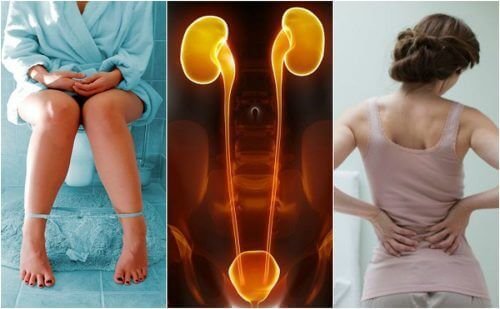Kidney Failure Symptoms: 7 Signs You Need to Know It’s no secret that good kidney function allows us to enjoy a high quality of life, as far as healthy is concerned
On occasion, reoccurring pain in the area of the kidneys can indicate a problem with these organs. These pains could be kidney failure symptoms. However, they could also appear because of a weakening of the muscles.
Although we usually don’t think about the importance of these organs, they work to help us to remove the liquids and toxins that can make the body sick.
In fact, during the day, they can process up to 190 liters of blood which, after a filtration process, allows us to expel around 2 liters of water and waste.
In addition, since they participate in the control of blood pressure and the secretion of some
hormones, there is no doubt that kidney health determines our well-being.
Due to this, it is essential to attend to any signs of anomalies or diseases in a timely matter, since any kidney failure symptoms could lead to the development of chronic problems.
On this occasion, we have collected 7 kidney failure symptoms that can appear when something isn’t quite right with your system.
Do not overlook them!
- Fluid retention and inflammation
One of the initial signs of renal failure is
uncontrolled inflammation in the body, which is usually accompanied by fluid retention .
These kidney failure symptoms are the result of the kidneys having difficulties filtering waste and producing urine. As a result, this causes waste to remain in the tissues.
Consult your doctor if you notice unusual inflammation in the:
Feet and ankles
Hands
Legs
Face
Abdomen
“Want to know more? Read: 7 tips to avoid fluid retention” - Loss of bladder control
You should take bladder control problems into account as one of many possible kidney failure symptoms.
An increase in the number of visits to the bathroom, or a reduction for no apparent reason, indicates that there may be some abnormality in the function of the kidneys. - Noticeable changes in the urine
The texture, color and odor of urine are characteristics that allow us to detect if the kidneys are having difficulties completing their tasks.
Noticeable changes, such as a more yellowish color than normal, could be warning signs of
infections or chronic problems.
It is also necessary to consult a doctor if:
Urine is foamy.
The smell is too strong or unpleasant.
It burns when urinating.
There is blood in your urine. - Skin rashes
Although rashes can appear due to multiple factors, a malfunction of the kidneys could explain their presence.
The organs fail to filter some toxins, which remain in the bloodstream. And, after the body transports them, they alter the normal production of oils from the skin.
As a consequence, unsightly acne may appear. However, it is almost always accompanied by an annoying sensation of itching and irritation. - Pain in the lower back
A recurrent pain in the lumbar area or on one of the sides of the body can be a sign of kidney failure symptoms.
Patients with this type of disease, especially older adults, report feeling this type of pain due to inflammation.
Although it may be a weakening of the muscles, we must not rule out the possibility that there is a problem with these organs. - High blood pressure
Patients diagnosed with kidney failure or kidney disease must constantly check their
blood pressure , as this can suffer serious alterations.
The functions performed by these organs help to keep in balance the levels of potassium and sodium, two key minerals that maintain blood pressure stability.
They also keep fluids in the body under control, while avoiding inflammation of the tissues and arteries.
On the other hand, we must bear in mind that hypertension can originate from a problem known as renal artery stenosis, which causes a
partial obstruction of the artery that carries blood to the kidneys.
Visit this article: Delicious morning shake for controlling high blood pressure

